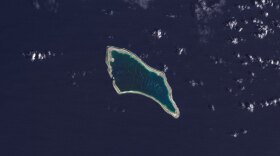Some recent developments in the South Pacific have focused on tensions involving the United States, China and Australia. But some former leaders of Pacific nations say that situation does not address the region’s most significant threat: climate change.
The Pacific Elders Voice group includes former leaders of the Marshall Islands, Palau, Kiribati and Tuvalu.
In a statement, the group says it is “suffering from many insecurities in our region. It is time that the international community focus on these insecurities, particularly in the context of climate change.”
Pacific countries have endured king tides and catastrophic cyclones. They’ve sustained droughts and the loss of low-lying islands to rising sea levels.
The group is calling on all nations to respect the sovereignty of Pacific Island countries and the right of Pacific peoples to develop their own security strategies.
The statement comes after last month’s news that China and the Solomon Islands signed a security agreement.
The deal has not been made public, but a draft that was leaked online raised fears that it could lead to China establishing a military base in the islands.
The Pacific Elders voiced concerns that major powers including the U.S., Australia and Japan were developing policies for the region without consulting Pacific leaders.
“The security and future of the Pacific must be determined primarily by Pacific Island countries and not by external powers," they said.




